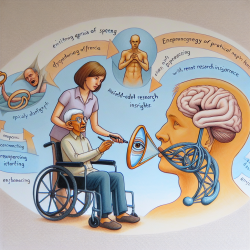Introduction
As a speech-language pathologist, the journey to improve therapeutic outcomes for children often involves exploring innovative approaches and integrating evidence-based practices. One such area of interest is the concept of Stress-Related Growth (SRG), which has been extensively studied in the context of cancer patients but holds valuable insights for broader applications, including pediatric therapy.
Understanding Stress-Related Growth
The Stress-Related Growth Scale-Short Form (SRGS-SF) was validated for Portuguese cancer patients, revealing its potential as a reliable tool to measure perceived growth following stressful events. This scale, originally developed by Park et al. (1996), provides a framework for understanding how individuals perceive positive changes in personal resources, social relationships, life philosophy, and coping skills after experiencing significant stress.
Application in Pediatric Speech-Language Pathology
While the SRGS-SF is primarily used in psycho-oncology, its principles can be adapted to speech-language pathology. Children undergoing therapy often face challenges that can be stressful, such as communication difficulties, social integration issues, and academic pressures. By understanding and measuring stress-related growth, practitioners can tailor interventions to foster resilience and positive adaptation in children.
Implementing SRG Principles
To incorporate SRG principles into your practice, consider the following steps:
- Assess Stress Levels: Use tools like the Distress Thermometer to gauge emotional distress in children, helping identify areas where growth can be facilitated.
- Encourage Reflection: Guide children to reflect on their experiences and identify personal growth, enhancing their self-awareness and motivation.
- Integrate Growth-Focused Interventions: Develop activities that promote coping skills, resilience, and positive social interactions.
- Collaborate with Families: Engage parents in the therapeutic process, providing them with strategies to support their child's growth at home.
Encouraging Further Research
The validation of the SRGS-SF in cancer patients underscores the importance of exploring stress-related growth across different populations. Speech-language pathologists are encouraged to conduct further research to adapt and validate similar tools for use with children, enhancing the effectiveness of therapeutic interventions.
Conclusion
Incorporating stress-related growth principles into speech-language pathology can lead to more holistic and effective therapeutic outcomes. By fostering resilience and positive adaptation, practitioners can empower children to overcome challenges and thrive. For a deeper understanding of the SRGS-SF and its applications, practitioners are encouraged to explore the original research paper: Stress-Related Growth Scale-Short Form: A Portuguese validation for cancer patients.










